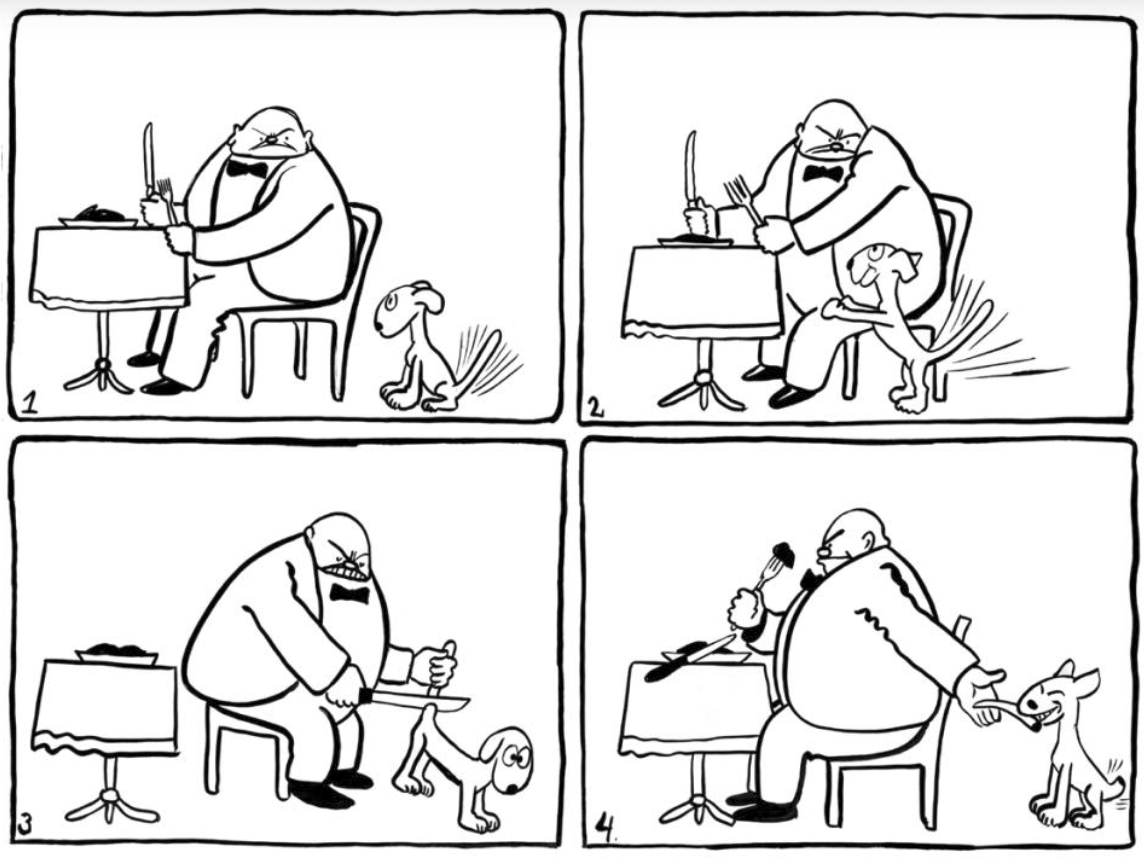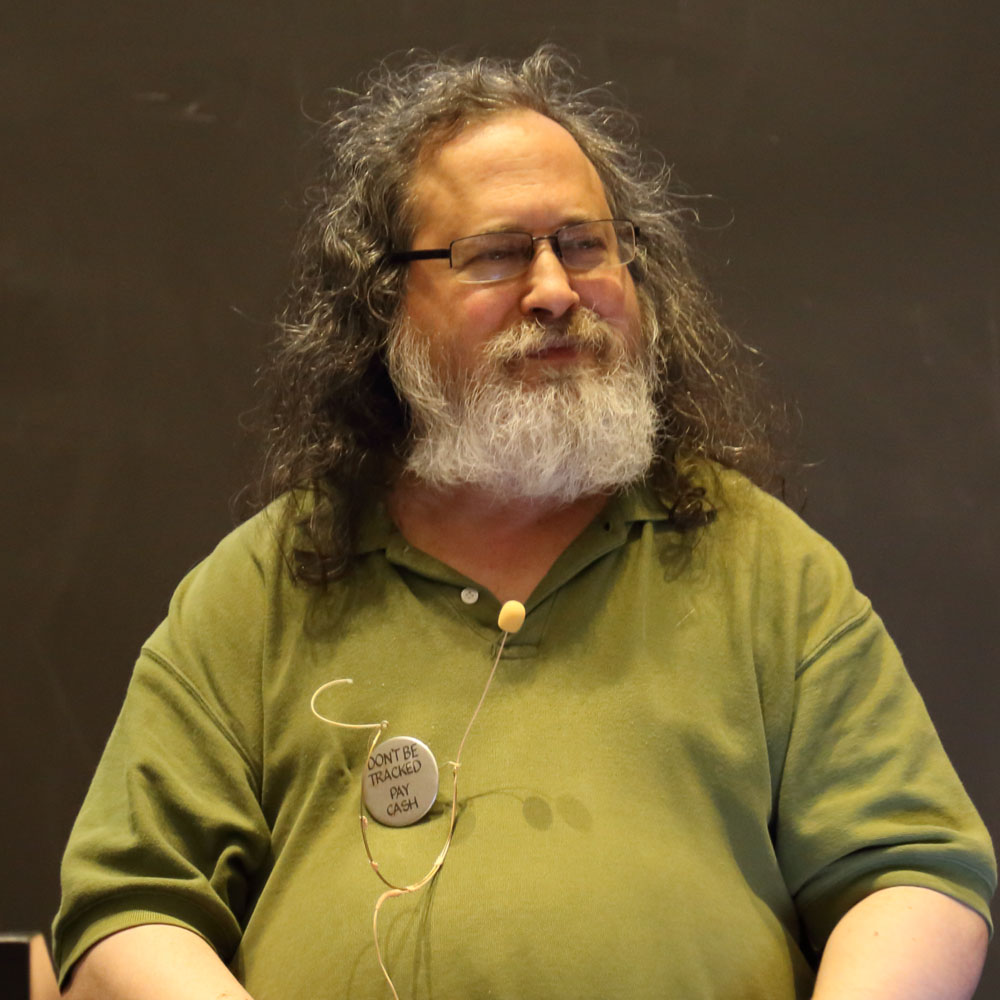
Robert Storm Petersen (1882-1949): "Dyre tider (Sociallovgivning)", 1919. © Storm P. Museet.
On "Freedom Software" vs "Open Source Software"
There is a Danish proverb claiming that "frænde er frænde værst". It may be translated into "kinsmen make better enemies than strangers do". This fact of life struck me when I recently attended a lecture given by Richard Stallman. Proponents of "free software" consider themselves opposed to proponents of "open source software" for reasons which I neither entirely understand nor entirely accept.
In the interest of free speech (I certainly have my ideologies, too), I’ll start off with a clear reference to what "free software" is all about: Read here and here.
Don’t be mistaken about my position: High quality software which is simultaneously free software and open source software is abundant, commendable and here to stay. Almost all of it is technically rooted in the GNU Compiler Collection originally written by Richard Stallman. Most of it is copyrighted through the GPL License originally written and still maintained by Richard Stallman, too.
The common antagonist: Closed Source Software
Closed source software is here to stay, too, whether you like it or not. "Like it or not" seems to be dividing line between the kinsmen referred to above. Personally, I think that many IT vendors sell something which is not really theirs, just as the man on the illustrating cartoon offers the dog a piece of its own tail (which it accepts all too willingly – and the cartoon is 100 years old…). A non-exhaustive list of ways to unjustly (but not unlawfully) sell IT services is:
- Wrapping public domain scientific research results into closed source software and sell it per floating point operation (thus obtaining a marginal profit from a sunk development cost).
- Making a profit from proprietary code lines which are older than the accepted lifetime of a patent (15-20 years).
- Selling information about people to third parties which will then spend some of their earnings promoting to the same people products or dubious information which they have not asked for (the Facebook and the Google business models).
Item 3 on the above list is for good reasons heavily debated these days. The "dog willingly eating its own tail" metaphor is particularly appropriate here. As a professional technician selling B2B services, however, item 3 is ultimately out of my sphere of interest.
A last comment on item 3, though: The ambiguity of the word "free" really comes into play here, as the dog’s tail offerings of Facebook and Google come at apparently no cost but at the same time deprives the gullible customer of a number of rights: privacy, copyright to own postings, etc.. Read more here and here.
"Open" and "Closed" are here to stay – deal with it
At the Richard Stallman lecture referred to above, he confirmed his previously expressed "accusation" that proponents of the "open source" concept are pragmatic. I am pragmatic – and feel at the same time heavily rooted in ways of thinking which to me look like those of Mr. Stallman. I see open source CAE software as a powerful way to liberate mechanical engineering from previous ties to people and organizations with enough capital to buy CAD and CAE software licenses.
(A digression: I have frequently been asked if I do not think that affordable CAE tools are dangerous in the wrong hands. My answer to this question is: "With good engineering judgment, you can make wonders. With bad engineering judgment, you can make disasters – irrespective of which tools you use." The fatality rate of military drones still exceeds the fatality rate of whatever drones people have 3D-printed themselves with today’s affordable toolchain for the entire engineering and manufacturing process. Put slightly differently: The real World will always outperform any virtual world, and any engineer worthy of the name knows that.)
Don’t make enemies when there is no need for it
I suggest that Richard Stallman’s contributions to the World are immense but can never the less be attributed a tongue-in-cheek score ratio of "2-2". On the pro side, you have
On the flip side, you have
- His original choice of the ambiguous word "free" to name his endeavors
- A co-bundling of political views which push some people away for no justifiable reason
The stroke of genius built into copyleft lies in the fact that (most of the) closed source world is forced to respect the "four freedoms" if they want the general public to respect their closed source use of the very same copyright legislation. This is exactly what Microsoft does today and probably the reason that Mr. Stallman’s endeavors vilify many companies but to a conspicuous extent leave Microsoft off the hook.
Another acknowledging nod to the views of Mr. Stallman: He has for "unjust closing of free software" coined the appropriate term "tivoization".
However, tivoization is here to stay, too
Software needs hardware in order to produce results (another instance of the real World outperforming every single virtual one). "Free hardware" may exist, but it has made no visible impact on the market. All other computers and computing devices contain hidden IP which is included in the price of the box. If you really want to, you can minimize your dependency of hidden IP, but you simply cannot avoid it.
So, free software will always coexist with something else. Even the most hardcore ideologists need a little pragmatism to boot their computer, so why not embrace that concept, too? My personal stance is: "Be pragmatic, but never forget your roots. That’s where the resources come from."
There is no such thing as a perfect villain
Google and Netflix may have objectionable business models. However, they also belong to the class of companies which know where the dividing line is and respect it. See here and here.
Or perhaps there is…
If you want to understand the concept of free software and the inherent necessity of the "four freedoms" through a metaphor, I suggest that of the terminator genes which towards the end of the previous century started off as a powerful new source of profit and ended up with virtually unlimited vilification. I agree with Richard Stallman that the "voice of the people" deserves to be heard and will find its way if the stakes are high enough. Monsanto has probably learnt the lesson which I expect Facebook to learn some day, too.

Richard Stallman giving a lecture about undisclosed subjects on an undisclosed date at an undisclosed location.

